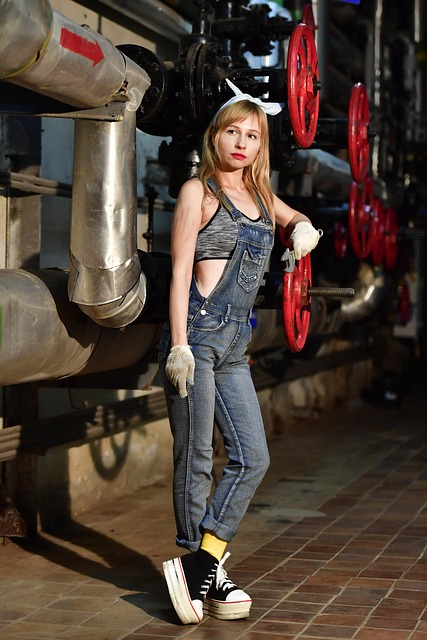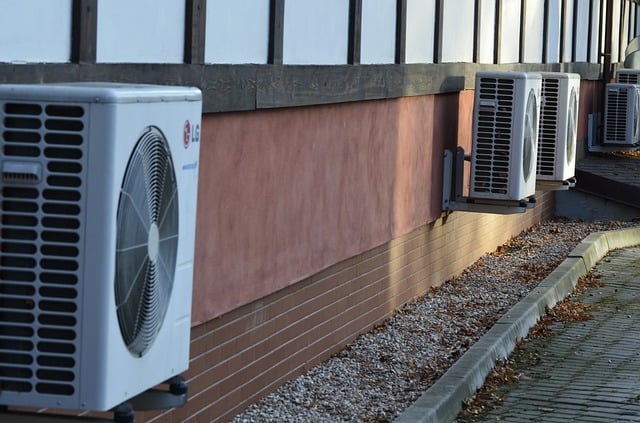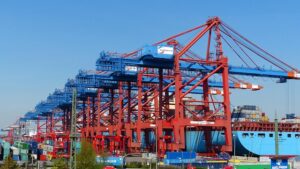Industrial unit heaters play a crucial role in maintaining optimal temperatures in commercial spaces like manufacturing facilities and warehouses. These heavy-duty heating systems come in various types, including gas-fired, electric, and suspended models, catering to specific needs. Integrating smart control systems enables precise temperature regulation through real-time data and automated controls, enhancing energy efficiency by optimizing BTU ratings and reducing operational costs. This technology allows remote monitoring and adjustments, making it ideal for modern commercial heating requirements, thereby boosting comfort and productivity in industrial settings. Regular maintenance and predictive sensors further extend the lifespan of these heaters, contributing to sustainable heavy-duty construction and industrial applications.
Smart industrial unit heaters are transforming how buildings maintain optimal temperatures. By integrating with building automation systems, these advanced heating solutions offer precise control, energy efficiency, and significant cost savings. This article delves into the symbiotic relationship between industrial unit heaters and automation, exploring benefits like enhanced comfort, improved safety, and reduced environmental impact. We’ll dissect key technologies facilitating this integration and provide insights on optimizing smart heaters for maximum efficiency.
- Understanding Industrial Unit Heaters and Their Role in Building Automation
- The Benefits of Integrating Smart Heating Solutions into Automation Systems
- Key Technologies Enabling Seamless Integration
- Implementing and Optimizing Smart Industrial Unit Heaters for Energy Efficiency
Understanding Industrial Unit Heaters and Their Role in Building Automation

Industrial unit heaters play a pivotal role in maintaining optimal temperatures within commercial spaces, especially in demanding environments like manufacturing facilities and warehouses. These specialized heating systems are designed for heavy-duty construction and offer efficient solutions for large-scale warehouse heating. They can be categorized into various types, including gas fired heaters, electric unit heaters, and suspended heaters, each tailored to specific industrial applications.
In the context of building automation, integrating industrial unit heaters with smart control systems allows precise temperature regulation. This technology ensures that heating is not only effective but also energy-efficient, optimizing BTU ratings and reducing operational costs. The ability to monitor and adjust settings remotely or based on real-time conditions makes these systems ideal for modern, technologically advanced commercial heating requirements, enhancing overall comfort and productivity in industrial environments.
The Benefits of Integrating Smart Heating Solutions into Automation Systems

Integrating smart industrial unit heaters with building automation systems offers significant advantages for warehouse heating and manufacturing facilities. These advanced solutions streamline temperature control, enhancing energy efficiency and reducing operational costs. By leveraging real-time data and automated controls, facility managers can optimize BTU ratings and forced air heating, ensuring every corner of the heavy duty construction environment is comfortably heated.
Smart heaters provide precise temperature regulation tailored to specific industrial applications, eliminating energy wastage. Whether it’s gas fired heaters or electric unit heaters, suspended heaters are strategically placed for even distribution. This not only improves employee comfort but also contributes to a more sustainable and cost-effective commercial heating approach.
Key Technologies Enabling Seamless Integration

The integration of smart industrial unit heaters with building automation systems is made possible through cutting-edge technologies. These include advanced communication protocols like Modbus and MQTT, which allow heaters to exchange data with other system components seamlessly. Sensors playing a pivotal role in this process monitor ambient conditions such as temperature, humidity, and occupancy, enabling precise control over the heating systems.
For instance, gas fired heaters or electric unit heaters, commonly used in warehouses and manufacturing facilities, can be equipped with suspended heaters designed for heavy duty construction in industrial applications. These heaters are not just powerful but also feature adjustable BTU ratings to cater to varying heat requirements. With forced air heating as a standard feature, these smart units ensure optimal temperature control, enhancing energy efficiency and overall commercial heating performance in diverse environments.
Implementing and Optimizing Smart Industrial Unit Heaters for Energy Efficiency

Implementing smart industrial unit heaters in manufacturing facilities and warehouses can significantly optimize energy efficiency, a crucial aspect for reducing operational costs and environmental impact. These advanced heaters, such as gas fired heaters or electric unit heaters, integrate seamlessly with building automation systems, enabling precise temperature control across heavy duty construction areas. By leveraging IoT technology, these smart heaters adjust heating output based on real-time occupancy and weather conditions, ensuring efficient use of energy. For instance, suspended heaters with forced air heating can distribute heat evenly while considering BTU ratings for various industrial applications, preventing energy wastage.
For optimal performance, regular maintenance is key. Automated systems can schedule cleaning and inspection routines for gas fired heaters or electric unit heaters, ensuring peak efficiency. Moreover, integrating smart sensors allows for predictive maintenance, identifying potential issues before they escalate. This proactive approach not only extends the lifespan of industrial unit heaters but also enhances overall commercial heating solutions in manufacturing facilities and warehouses, contributing to a more sustainable future in heavy duty construction and industrial applications.
Smart industrial unit heaters that integrate with building automation systems offer a powerful solution for optimizing energy efficiency, comfort, and control in any facility. By leveraging advanced technologies, these systems enhance overall building performance while reducing operational costs. Implementing this integration is a strategic move towards a more sustainable future, ensuring optimal heating management and setting new standards for intelligent buildings.













